#tam dalyell
Text
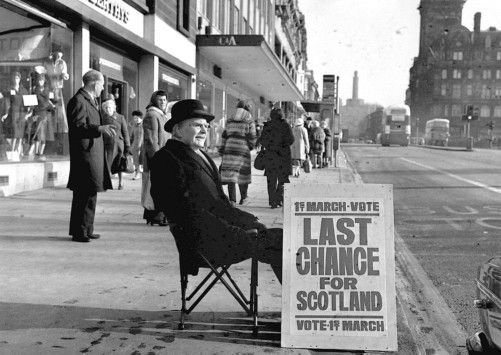
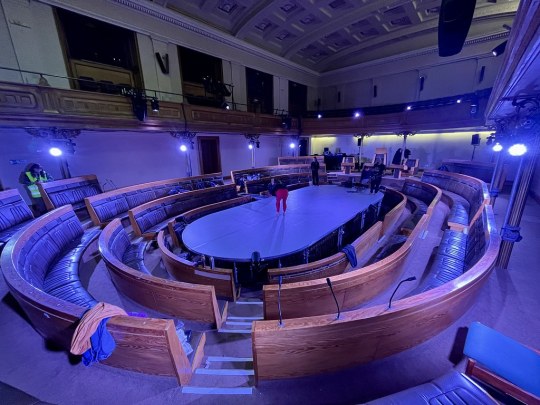
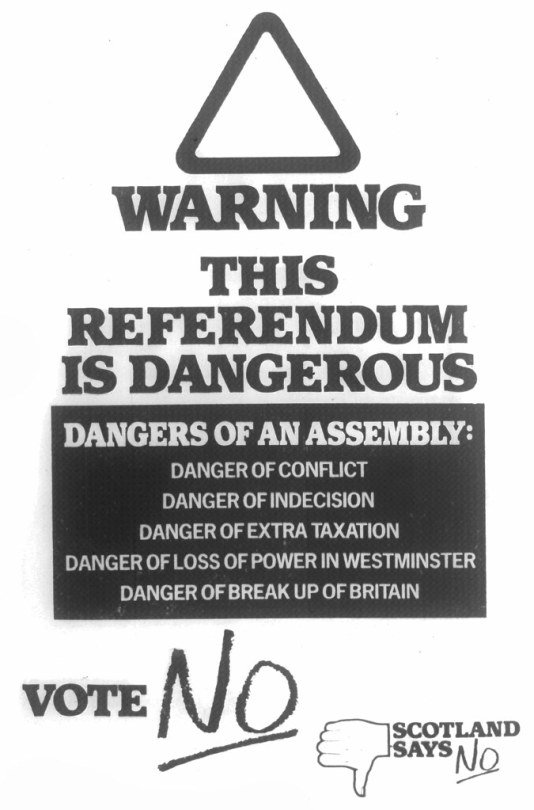
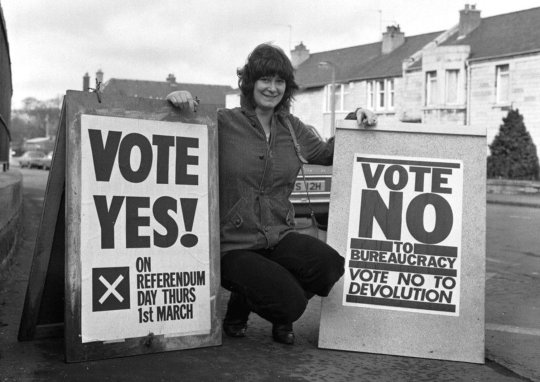

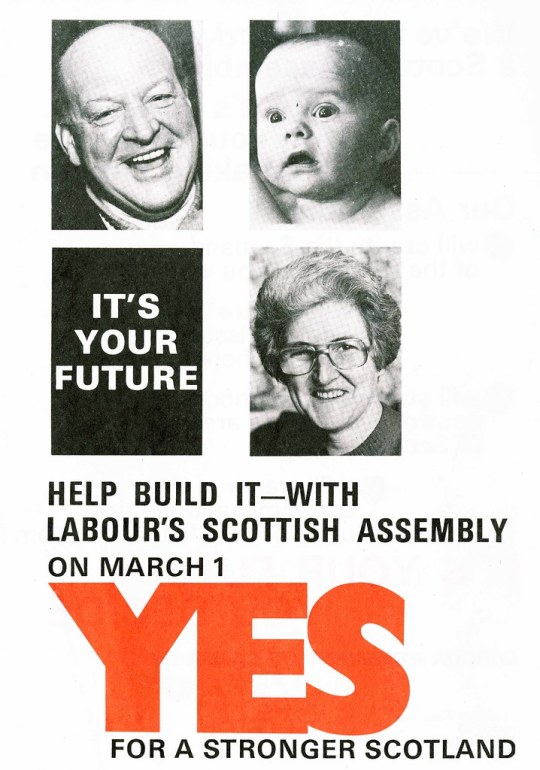
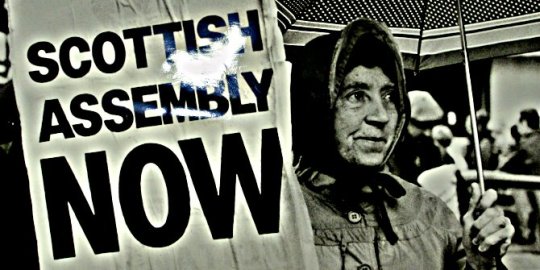
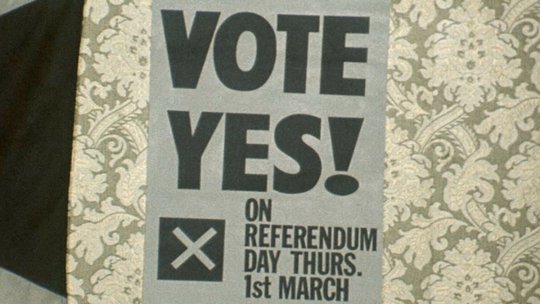
On March 1st 1979 Scots voted in favour of Devolution, but failed to reach the required 40% of the population in favour of implementing it - due to 36% of the electorate not voting.
THE PLOT.
The introduction of devolution legislation in 1976 was largely the product of nationalist pressures on the Government. James Callaghan's Labour government had a majority of only three after the 1974 (October) election and by 1977 had no majority at all after a series of by-election defeats. The government was therefore vulnerable to pressures from the Scottish National Party and Plaid Cymru, who between them won 14 seats at the election (SNP 11, Plaid Cymru 3). The Kilbrandon commission had reported in 1974, recommending the establishment of a Scottish parliament and endorsing the principle of devolution.
A combined Scotland and Wales Bill was introduced in November 1976. It gained a second reading only after referendums in both Scotland and Wales had been conceded. The Shadow Secretary of State for Scotland, Alick Buchanan-Smith, and one of his front benchers, Malcolm Rifkind, resigned their posts when the Shadow Cabinet decided to oppose its second reading. On the first day of committee 350 amendments were put down. Michael Foot, (then Lord President and Cabinet Minister responsible for the devolution bill) was reluctant to impose a guillotine. After nearly 100 hours of debate only three and a half clauses of the bill had been considered. A guillotine motion was tabled but defeated in February 1977. The Bill was withdrawn.
In November 1977 separate Bills for Scotland and Wales were introduced, with support from the Liberals. This reduced opposition from those who had previously opposed the combined Bill on the grounds that the Welsh did not really want devolution. This time the guillotine motion was won.
As the committee stage was nearing its end, it scrutinised an amendment from Labour backbencher George Cunningham. It required the Secretary of State to lay before Parliament an order repealing the Act unless at least 40% of the eligible electorate voted "yes". The amendment was strongly opposed by the Government, but they lost the vote by 166 votes to 151.
In the referendum, on 1st March 1979, Scotland voted in favour of devolution by 52% to 48% - but only 32.9% of the electorate had joined the majority. In Wales the vote was against devolution, by 80% to 20%. The Acts were repealed the next month.
The Government was not helped by the extent of internal dissent within the Labour party. There was an active Labour 'Vote No' campaign in Scotland, of which Brian Wilson was Chairman, and Robin Cook a Vice-Chairman together with Tam Dalyell.
In Wales, Neil Kinnock was among those who campaigned for a "no" vote. During the last few days of the campaign in Wales, the pro-devolution Labour party -TUC group argued that a "No" vote would be a vote for the Tories, and a vote against the Government. This was a gamble that did not pay off; the scale of the "No" victory meant that those who had campaigned against the government could feel vindicated.
A motion of no confidence in the government was tabled by the Conservatives and supported by the SNP, the Liberals and eight Ulster Unionists. This motion was carried by one vote on 28th March 1979. The next day Callaghan announced that Parliament would be dissolved.
The 1979 Results:
Scotland: Question: Do you want the provisions of the Scotland Act 1978 to be put into effect ?
Yes 1,230,937 (51.6%)
No 1,153, 502 (48.4%)
Rejected ballot papers 3,133
Electorate 3, 747,112
Turnout 63.6%
But, we Scots are known the world over for this saying. Try, try and try again we did and won our parliament. We did and we put the party in powder who would take us to freedom. We will never give up our fight to be an Independent country once more.
22 notes
·
View notes
Text
Alastair Lethbridge-Stewart and Colin Mitchell
Although Haisman and Lincoln created the character of the Colonel and Derrick Sherwin has also tried to claim credit, for my money the real credit for the creation of one of the show’s longest running and most beloved characters belongs to the man who (eventually) cast Nicholas Courtney in the role. Douglas Camfield re-made the character of Colonel Lethbridge in the image of someone he admired (Lt Col. Colin Mitchell) and in the process made him an Anglicised Scot, gave him a double-barrelled name and made him an officer like Mitchell in a Highland regiment (Michell’s was the Argyll and Sutherland Highlanders). Take a look at how closely the look of Lethbridge-Stewart resembles Mitchell:

Now Mitchell leading his men into the Crater District in Aden was the last gasp of empire and he later stood as a Tory MP. He was a small, wiry Scot who worked is way up from the rank of Private and neither Nicholas Courtney nor the original casting choices physically resembles him much, in fact someone like Fulton Mackay may have been a closer fit. Nor can I see Lethbridge-Stewart leading his troops into battle against the Autons with 15 pipers playing ‘Scotland the Brave’! Although now I’ve thought of that I’m tempted to write it! Strangely the Highland aspect of Lethbridge Stewart would not be mentioned again until the Camfield directed ‘Terror of the Zygons’, the character’s last regular appearance. So, Camfield rather has just appropriated the image of Mitchell, not especially the character – aside from his oft-quoted ‘leading from the front’ and defining him as as an independent thinking, unconventional soldier. It is worth noting that Mitchell is far from just being the right-wing colonialist he is portrayed as – read his obituary from ‘The Independent’ written by his friend the MP Tam Dalyell, a rather surprising friend at that – he was right wing, but also fiercely anti-apartheid and spent his last days running a charity to clear landmines in places like Angola and Mozambique – showing that caricaturing people on their politics alone rarely presents the whole truth.
Douglas Camfield was supposedly himself rather right wing, somewhat of an anomaly in the BBC of the 60’s, 70’s and 80’s. However he was a bloody good director and much-loved by the people who worked with him. Maybe the show shouldn’t always be made by people with the same views as me, I’m not entirely sure that is healthy. I wouldn’t like to see that conviction tested too far, I can’t imagine a story that provided support for Thatcher or Trump, but certainly at a more abstract level – the level that ‘Doctor Who’ normally operates, when exploring things like pacifism, war, appeasement and resistance, a diversity of views can help, we are talking about big moral issues, with no real answers and opposing views that can be legitimately argued.
(via Web of Fear by Mervyn Haisman and Henry Lincoln (1968) – A Journal of Impossible Things)
2 notes
·
View notes
Text
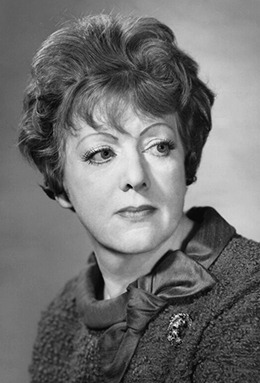
Renee Short (Born April 26th, 1919) was a British Labour MP who held the constituency of Wolverhampton Northeast from 1964-1987. A former journalist, some of her particular interests were general and women’s health, social and family care, abortion law reform, women’s representation in parliament, and race relations. By the 1980s she was considered on the Soft Left of the party, aligned with Neil Kinnock.
Renee Short’s constituency neighbour was Tory Enoch Powell. In her 2003 obituary published in The Independent, fellow Labour MP Tam Dalyell wrote;
“…Her parliamentary life was much complicated by the fact that as Member for Northeast Wolverhampton she shared that city with the Member for Southwest Wolverhampton – J. Enoch Powell. Normally two MPs albeit of different parties have a decent working relationship. But in the Short and Powell case this was impossible. One of the first flash points was just before polling day in 1970 when "N***** Neighbour" stickers started to appear round Wolverhampton, prompting Short to denounce these Fascist tactics. Powell, determined to play down the situation at that stage, said: "I have not seen nor heard of these." Short responded to The Wolverhampton Express and Star that Powell was lying. Later Short asked Elwyn Jones as Attorney General whether Powell could be prosecuted under the Race Relations Act. It was this kind of ugly situation which reduced Short's majority in Wolverhampton Northeast to under 2,000 from the 8,102 which she had enjoyed in 1966…”
The reference to N***** Neighbour related to an escalation of a racist campaign trope that had featured also in Smethwick at the 1964 general election. “…If you desire a coloured for your neighbour, vote Labour. If you are already burdened with one, vote Tory…”
Dalyell suggests that Renee Short was ‘winkled out’ of reselection for the 1987 election, a victim of Labour’s internal struggles with the Trotskyist Militant Tendency faction, which seemed to be dominating her local constituency party at that point. She was described as a ‘much respected local MP’, and ‘superb at championing local causes’. The seat fell to the Conservatives, with a majority of just over 200 votes, but returned to Labour in 1992.
According to The Guardian;
“…She announced her intention to retire in the summer of 1985, just before facing a tough re-selection battle; in 1981, she had been re-selected by only three votes, and the likelihood was that she would not have been chosen again. It was, in many ways, an ungrateful response from a party she had loyally served with a profound commitment to the simple socialist belief of the need to improve the lot of the greatest possible number of people…”
Jack Jones, of the Transport and General Workers Union, Renee Short’s sponsor, said that she "impressed us as a champion of women's rights, and working people felt that she was on our side".
Having battled illness for some time, Renee Short passed away in 2003, aged 83.
#women in history#women in politics#race relations#uk politics#uk politicians#social justice#social history#working class history
14 notes
·
View notes
Text
Events 11.28 (before 1920)
587 – Treaty of Andelot: King Guntram of Burgundy recognizes Childebert II as his heir.
936 – Shi Jingtang is enthroned as the first emperor of the Later Jin by Emperor Taizong of Liao, following a revolt against Emperor Fei of Later Tang.
1443 – Skanderbeg and his forces liberate Kruja in central Albania and raise the Albanian flag.
1470 – Champa–Đại Việt War: Emperor Lê Thánh Tông of Đại Việt formally launches his attack against Champa.
1520 – After 38 days, an expedition under the command of Ferdinand Magellan completes the first passage through the Strait of Magellan and enters the Pacific Ocean.
1582 – In Stratford-upon-Avon, William Shakespeare and Anne Hathaway pay a £40 (equivalent to £12,261 in 2021) bond in lieu of posting wedding banns, which enables them to marry immediately.
1627 – The Polish–Lithuanian Commonwealth Navy has its greatest and last naval victory in the Battle of Oliwa.
1660 – At Gresham College, twelve men, including Christopher Wren, Robert Boyle, John Wilkins, and Sir Robert Moray decide to found what is later known as the Royal Society.
1666 – At least 3,000 men of the Royal Scots Army led by Tam Dalyell of the Binns defeat about 900 Covenanter insurgents led by James Wallace of Auchens in the Battle of Rullion Green.
1785 – The first Treaty of Hopewell is signed, by which the United States acknowledges Cherokee lands in what is now East Tennessee.
1798 – Trade between the United States and modern-day Uruguay begins when John Leamy's frigate John arrives in Montevideo.
1811 – Beethoven's Piano Concerto No. 5 in E-flat major, Op. 73, premieres at the Gewandhaus in Leipzig.
1814 – The Times of London becomes the first newspaper to be produced on a steam-powered printing press, built by the German team of Koenig & Bauer.
1821 – Panama Independence Day: Panama separates from Spain and joins Gran Colombia.
1843 – Ka Lā Hui (Hawaiian Independence Day): The Kingdom of Hawaii is officially recognized by the United Kingdom and France as an independent nation.
1861 – American Civil War: The Confederate States of America accept a rival state government's pronouncement that declares Missouri to be the 12th state of the Confederacy.
1862 – American Civil War: In the Battle of Cane Hill, Union troops under General James G. Blunt defeat General John Marmaduke's Confederates.
1885 – Bulgarian victory in the Serbo-Bulgarian War preserves the Unification of Bulgaria.
1893 – Women's suffrage in New Zealand concludes with the 1893 New Zealand general election.
1895 – The first American automobile race takes place over the 54 miles from Chicago's Jackson Park to Evanston, Illinois. Frank Duryea wins in approximately 10 hours.
1899 – The Second Boer War: A British column is engaged by Boer forces at the Battle of Modder River; although the Boers withdraw, the British suffer heavy casualties.
1905 – Irish nationalist Arthur Griffith founds Sinn Féin as a political party with the main aim of establishing a dual monarchy in Ireland.
1908 – A mine explosion in Marianna, Pennsylvania, kills 154 men, leaving only one survivor.
1912 – Albania declares its independence from the Ottoman Empire.
1914 – World War I: Following a war-induced closure in July, the New York Stock Exchange re-opens for bond trading.
1917 – The Estonian Provincial Assembly declares itself the sovereign power of Estonia.
1918 – The Soviet Forces move against Estonia when the 6th Red Rifle Division strikes the border town of Narva, marking the beginning of the Estonian War of Independence.
1919 – Lady Astor is elected as a Member of the Parliament of the United Kingdom. She is the first woman to sit in the House of Commons. (Countess Markievicz, the first to be elected, refused to sit.)
1 note
·
View note
Text
Body of former Labour MP Tam Dalyell donated to science
UK News
Body of former Labour MP Tam Dalyell donated to science
The body of the veteran Scottish politician Tam Dalyell has been left to science, his family has confirmed.The 84-year-old, who was a Labour MP for more than 40 years, died last week following a short illness. In a statement, his family said he had requested for his body to be left to Edinburgh University for research, followed by a private interment.The Old Etonian was first elected to Parliament in 1962 as MP for West Lothian, and served as a parliamentary aide to the cabinet minister and diarist Richard Crossman. He became MP for Linlithgow 21 years later and was named Father of the House - the longest continuously serving MP - in 2001.
Very sad to hear of the death of former Labour MP, Tam Dalyell - a real giant of Scottish politics. My thoughts are with his family.
Scottish First Minister Nicola Sturgeon
A fierce critic of British military involvement, he was suspended from the Commons several times, twice for accusing Margaret Thatcher of lying over the Falklands conflict. He also branded Tony Blair a war criminal over the invasion of Iraq in 2003. A private memorial service will be held in his home county of West Lothian in Scotland at the end of February, with a further service due to be held in London at a later date.
Tam was a titan of parliamentary scrutiny, fearless in pursuit of the truth. From Iraq to the miners' strike, he doggedly fought to expose official wrongdoing and cover-ups
Jeremy Corbyn, Labour leader
0 notes
Photo

Tom Dalyell with a rabbit and two mice.
0 notes
Text
RIP 2017
Sir Roger Moore
Sir John Hurt
Mary Tyler Moore
Robert Hardy
Tim Pigott-Smith
Adam West
Martin Landau
Richard Hatch
Erin Moran
Sashi Kapoor
Om Puri
Bill Paxton
Barry Norman
Gordon Kaye
Liz Dawn
Roy Barraclough
Hywel Bennett
Peter Sallis
Jane Freeman
Geoffrey Bayldon
Rodney Bewes
Keith Barron
Tony Booth
Roy Dotrice
Tony Hagarth
Sir Peter Hall
Rosemary Leech
Sara Coward
Sir Bruce Forsyth
Keith Chegwin
Sean Hughes
John Noakes
Brian Cant
Carol Lee Scott
Andy Cunningham
Desmond Carrington
Brian Matthew
Steve Hewlett
Heinz Wolff
William G Stewart
Clare Hollingworth
Frank Delaney
Colin Dexter
Michael Bond
Alan Simpson
Jerry Lewis
Antonio Carluccio
Jill Saward
Christine Keeler
Martin McGuiness
Cormac Murphy-O'Connor
Lord Snowdon
Tam Dalyell
Rhidri Morgan
Sir Gerald Kaufman
Rodney Bickerstaff
Paul Weitz
Hans Rosling
Ian Brady
Max Clifford
Charles Manson
Jana Novotna
Baroness Heyhoe Flint
Graham Taylor
Joost van der Westhuizen
Ugo Ehiogu
Tommy Gemmell
Sir Colin Meads
Ronnie Moran
Jake LaMotta
John Surtees
Tim Gudgin
Tom Petty
Glen Campbell
Don Williams
Joni Sledge
Walter Becker
Malcolm Young
Gregg Allman
John Geils Jr
David Cassidy
Peter Sarstedt
Peter Skellern
Johnny Hallyday
Fats Domino
Chris Cornell
Chuck Berry
Tara Palmer-Tomkinson
Hugh Hefner
RIP to everyone who lost their life this year. Reblog and add anyone else's name who is missing from the list.
8 notes
·
View notes
Text
Jeremy Corbyn statement on the passing of Tam Dalyell
Jeremy Corbyn, Leader of the Labour Party said:
“I'm so sad to hear of the death of my good friend and comrade Tam Dalyell. Our thoughts are with his family.
“Tam was a titan of parliamentary scrutiny, fearless in pursuit of the truth. From Iraq to the miners’ strike, he doggedly fought to expose official wrongdoing and cover ups.
“The title of his autobiography summed Tam up to a tee: 'The Importance of Being Awkward.'
“But he was much more than that: Tam was an outstanding parliamentarian, a socialist and internationalist, and a champion of the underdog, here and abroad.”
5 notes
·
View notes
Text
Labour and England 1997-2010
With Labour again promising devolution to England, it’s worth understanding why it didn’t happen last time
First published in Renewal
John Denham
New Labour entered government in 1997 with a partly-formed agenda on devolution which sidestepped the West Lothian question; the party subsequently lost many working-class voters who saw themselves as more English than British. If the party is not to repeat the mistakes of the past, we must think about English identity and the expression of England’s interests within our constitution now.
One of the curious features of the New Labour administration of 1997-2010 was that its sweeping and unprecedented constitutional reforms made little change to England.
Devolution to Wales and Scotland created an Assembly and Parliament, both of which gained further powers in subsequent years. The Northern Ireland Assembly, also with significant devolved powers, was a key outcome of the peace process. The role of hereditary peers was reduced by House of Lords reform. A new Supreme Court was established, and the incorporation of the European Convention on Human Rights and the introduction of the Freedom of Information Act entrenched new rights. Referenda were established as the expected way of taking constitutional decisions.
Yet, with the exception of the Mayor and Assembly in London, England was untouched by this wave of constitutional reform. England is now the only part of the UK which does not have the right to elect representatives with sole power to determine domestic policy on education, health and many other issues. It has no legal presence in government: an omission that is causing new tensions as the UK and the devolved nations consider how powers are to be returned from Brussels. Despite the introduction of English Votes for English Laws by the Conservatives - adamantly opposed by Labour - there is no discernible ‘English Voice’ in Parliament. England remains a nation that is barely named or acknowledged as such in government policy or public debate.
While many on the left argue that England has no national identity, nor any claim for a political identity, the Brexit vote of 2016 was a largely English affair. The bulk of Leave votes came from England and from those voters who identified most clearly as English. The same voters are, far from being ‘greater Britain’ unionists, less likely to attach great importance to the union, most likely to want English MPs to make English laws, to support an English Parliament, and be least happy with the Barnett formula.
The lack of any democratic and political identity for England may have fed the resentments that demand we ‘take back control’, and it certainly contributed to England’s continuing economic, social and cultural divisions. England is divided by age, geography, education, income and wealth. There is a growing consensus (for example, in the IPPR report on Economic Justice) that decentralisation is essential for inclusive economic growth. The governance of England will remain a live issue for the foreseeable future. It is important to understand why Labour failed to properly address the English question last time if the next Labour government is not going to fail again.
The standard story is that Labour had attempted to establish elected regional assemblies, but, after much delay and internal debate, a weak proposal was rejected by North East voters in a referendum in 2004 and the whole scheme was dropped. This simplistic account is not only inaccurate (for example, Labour’s commitment to elect rather than appointment assemblies was always ambiguous at best): it also tells us little about the underlying politics and statecraft of New Labour.
A more detailed study shows that Labour policy towards devolution in the 1990s and 2000s was shaped by three factors:
• a deep commitment to the unitary imperial state: Welsh and Scottish devolution were not seen by UK Labour as principled constitutional reforms but as a politically calculated necessity
• a tradition of centralism, distrust of local democracy, and the absence of a party consensus on devolution
• a denial of, and suspicion towards, any English political identity.
In taking these stances, Labour was not out of step with the dominant thinking amongst the political and administrative leadership of the UK. It is also reflected the liberal left’s particular antipathy to the idea of English national identity: an opposition it did not extend to Wales or Scotland. Neither England nor Englishness featured in the original Charter 88.
At popular level, however, polling showed a plurality of support for English MPs to make English laws from the moment of the Scottish and Welsh devolution acts onwards. This large minority found no organised expression in the political system. Although the Conservatives included English Votes on English Laws in their 2005 manifesto, it barely featured in their public campaigning.
Labour and the regions
Labour had taken an interest in regional economic policy from the 1960s (when Scotland and Wales were regarded as regions). Future deputy prime minister John Prescott led regional policy from the early 1980s. In the 1990s, the Major administration set up government offices for the regions. Under Prescott’s plans, Labour proposed to add to this through the establishment of regional development agencies (RDAs), and to create nominated assemblies to hold them and the rest of the ‘regional state’ to account.
Prescott moved quickly to establish the RDAs and nominated regional assemblies. But the government’s commitment to democratise these new regional structures was far from clear and was predicated on a local government reorganisation that never took place. In any case, it was never clear whether assemblies – whether nominated or elected – would have the power to set different priorities from those emerging from Whitehall.
Over time the political presentation of New Labour’s programme changed radically. In the 1997 election and immediately after, the creation of regional assemblies in England was explicitly described as an integral part of wider UK constitutional reforms. By 2005 – after the North East referendum – that wider context was dropped entirely. But while New Labour abandoned attempts to create elected regional bodies it nonetheless built a far more extensive regional administrative state than it inherited. Labour put ever more functions into regional offices, and was integrating them more closely, right up until 2010.
However, these regional structures were an extension of Labour’s inherent centralism. The over-riding aim was to ensure the better delivery of central priorities by better engaging local stakeholders. With only a few Other than minor exceptions, it was not committed to the transfer of power from the centre to localities; nor was any devolution unconditional or irreversible. The priorities and targets for RDAs on job creation, skills, housing and employment were set centrally; it was their delivery that was negotiated with local partners. Because the system operated without providing any formal statutory powers to the localities, targets could be changed and funding varied and withdrawn centrally at any time. Government did not usually act in such a capricious manner, but local government was well aware it did not have the power to amend targets or priorities.
Maintaining the unitary state
In reality, Labour had never reconsidered its fundamental commitment to the post-imperial unitary state: the idea that proper and effective government was run from Whitehall. As Prescott has said:
We are a naturally centralised party; we believe in capturing power and then to use it; and that, to use it, is by central government ministers doing it. Most of our people were centralisers when we came in (interview with author, 2017).
While Labour leaders in Scotland and Wales undoubtedly believed that devolution would offer improved national government, the leadership of UK Labour regarded devolution as a politically necessary expedient (not least because it held out the promise of ‘killing nationalism stone dead’, in the words of George Robertson MP, Labour’s Shadow Scottish Secretary). It was not the result of a fundamental re-think of how a Labour government should work or manage the state. There is little evidence that the UK leadership of the Labour Party believed that either Scotland or Wales would be better governed by devolved governments. The strenuous efforts made to stop Rhodri Morgan becoming Welsh leader, for example, reflected the centre’s view that devolution should result in as little deviation from central policy as possible. It was only after Morgan became first minister that he was able to talk of ‘clear red water’ between Wales and the UK government, and to create the sense of a distinct Welsh political space.
The inevitable corollary of this commitment to the unitary state was that the governance of England did not need to change. England had always been governed by the UK Parliament and would continue to be so.
Tony Blair certainly seemed a very pragmatic constitutionalist; he wasn’t particularly interested per se in constitutional reform. He didn’t get terribly excited by the notion of regions; that you needed to have a regional equivalent in England of the assemblies or parliaments that you were establishing in Wales and Scotland (Geoffrey Norris, No 10 advisor, interview with author, 2017).
The governance of England
Despite Tam Dalyell MP raising the ‘West Lothian question’ repeatedly in the late 1970s, his warnings that England would increasingly be in an anomalous and politically contentious position after devolution did not seem important to a PLP that enjoyed a large majority in both England and the UK. Within a few years of its election in 1997, however, New Labour became dependent on its Scottish and Welsh MPs to impose unpopular legislation – on NHS Foundation Trusts and university tuition fees – that were opposed by many English Labour MPs and would only affect English constituents. By that time it had become a practical and constitutional imperative to deny any English political identity; to do anything else would have undermined the legitimacy of key government policies for England.
Nor did Labour leaders in local government have coherent aspirations for England-wide change. Despite rhetorical demands for powers, resources, and freedom from burdensome central targets, Labour local authorities did not formulate clear demands for change, and resisted moves to reform two-tier local government. The promise of money usually trumped the promise of powers.
The demand for political devolution would always be sidestepped and confused by a promise of funding or competence for economic development. The real interest in the Labour Party is much more in regional economic imbalances than it is in constitutional change (Mike Ward, former LP advisor, interview with author, 2017).
Nonetheless, the efforts of Greater Manchester authorities and other major cities to re-shape their local economies were reflected in Labour’s growing emphasis on city-led growth after 2005. The persistent pursuit of this clear local agenda gained influence as it became increasingly clear that centralist administration was failing to deliver the expected results. Change on the ground, however, was limited, with the Greater Manchester Combined Authority only approved days before the 2010 election. It was the incoming coalition that built on Labour’s city-led legacy, while sweeping away Labour’s regional state in 2010. But the power relationship did not change. So-called ‘devo-max’ was still focused on the local delivery of national priorities.
England and the English
If few in Labour considered England’s governance seriously, even fewer engaged with English identity. If they did, they were usually against it. Most Scottish and Welsh politicians, and many English unionists, held the view that recognising England’s identity would threaten the union because of England’s very size within the union. (This conclusion, taken from the early 1970s Kilbrandon report, was rarely seriously interrogated, and it is only in recent years that it has begun to be re-examined.1)
Many also saw Labour’s essential nature as representing the more deprived parts of the UK against a southern Conservative England. They wanted to maintain this axis, even though that political coalition had been fractured by devolution. The dominant view both amongst Welsh and Scottish Labour, and in the English party, was that regional and local differences within England outweighed any common sense of English identity.
To be fair, the 1997 election predated the sharp rise in declared English identity around the millennium. The now well-established correlation between identity and voting patterns was not apparent in the 2001 election. It is easier with hindsight to see how the progressive loss of part of Labour’s working-class vote was concentrated in communities and amongst voters who increasingly identified as English, or more English than British.
Nonetheless, few Labour figures addressed Englishness during this period. Liam Byrne and Ruth Kelly published a pamphlet on English Socialism around 2005. This author explored the nature of English identity in speeches in 2009 and 2010. Jack Straw was early to see that devolution and the EU would revive Englishness but was torn between its recognition and what he saw as its inherent violence:
We should recognise the downside of being English – this aggressive, jingoistic streak – and try to eliminate it … the English are potentially very aggressive, very violent (Jack Straw MP - cited in Esler 2015).
Such engagements were few and far between.
Blame for the failure to change England cannot be laid solely at the door of Labour’s leaders. Support for a centralist state and weak advocacy of devolution ran through the party, as former Constitutional Affairs Select Committee chair Graham Allen MP observed.
It just wasn’t that we were ‘ready to go’ and then a few people at the top stopped it. In a real sense the party itself wasn’t really geared for a radical devolution to England (Graham Allen MP, interview with author, 2017).
What next?
The pressing question is whether the next Labour government will be any different to the 1997-2010 administration.
During his leadership, Ed Miliband spoke once about English identity, but he and Ed Balls were strongly opposed to English local authorities making devolution deals with Conservative ministers, suggesting that their concept of devolution remained dependent on central political authority.
The 2017 manifesto spoke of a relationship of equals between England, Wales and Scotland, and a Minister for England. Other parts, though, hinted at a return to regional administration subject to the UK government, and yet others to a federal solution for the UK. Labour says it is the party of devolution, but the proposed national care and national education systems are strongly suggestive of a more centralist approach. A discussion document on devolution within England has been promised but not yet published.
The manifesto promised a constitutional convention, although this will be not be established until after the election, therefore pushing fundamental reform into Labour’s second term. The polls suggest that any popular constitutional convention would throw up support for a much greater role for English MPs in making English laws, but there is little sign that Labour would support that change, whether in Westminster or an English Parliament.
Nor is there yet any greater consensus on the best form of devolution within England, with north vs south, regional, city and town focused models of devolution all having their own advocates. Similar divisions after 1997 allowed the influence of Whitehall centralists to dominate.
Labour remains ambiguous about English identity. The party has proposed four new national saints’ day bank holidays, including one for St George. Jon Trickett, one of Corbyn’s closet Shadow Cabinet supporters, has spoken powerfully about England. On the other hand, most shadow cabinet members don’t mention England even when referring to policy only relevant to England, and, as yet, Jeremy Corbyn has not addressed the issue.
In short, it is far from clear that Labour is either about to abandon its reliance on a centralised unitary state as the best system of governance for England. It certainly seems unwilling to accept that English voters should enjoy the same rights to determine domestic policy as those in Wales, Scotland and Northern Ireland. And, with some honourable exceptions, most senior MPs are unwilling to acknowledge England’s political or cultural identity, or to play a role in shaping it.
In short, it seems most likely that any devolution from the UK government to England’s localities will be no more radical than under New Labour, while the prospects for any national recognition of England as a democratic unit of government seem rather distant. The party is committed to a constitutional convention but its remit and working methods are unclear. Any outcome of a convention that begins after the next election would not lead to reform until Labour’s second term. But the lesson from 1997-2010 is that if the questions about the governance of England are not answered before Labour gets into government, they won’t be well answered afterwards.
John Denham is Professor and Director of the Centre for English Identity and Politics, University of Winchester, and is a former MP and Cabinet Minister.
This article is based on John’s chapter in Governing England, published by OUP for the British Academy, November 2018.
Notes
1. Royal Commission on the Constitution (Kilbrandon Commission), Cmnd 5460, 1973.
0 notes
Text

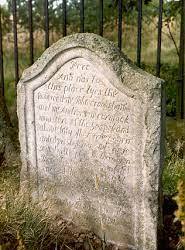
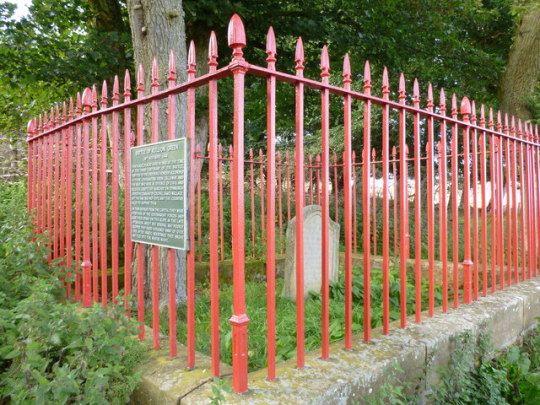
On November 28th 1666 the King's army defeated Covenanting forces at the Battle of Rullion Green in the Pentlands.
This post connects with last Sundays one on General Tam Dalyell. Although not a story from history that you might remember from your school days, the Battle of Rullion Green near Penicuik played a huge part in the history of our country, and is seen as a decisive step towards establishing Presbyterianism as the form of governance of the Church of Scotland and the supremacy of local democracy over the divine right of Kings.
The Pentland Rising was in the context of the long-running government campaign to impose Episcopalianism upon Scotland.
The uprising began in the Ayrshire town of Dalry. The long march of the Covenanters started with the rescue of an old man in the town from soldiers tormenting him. The group gathered followers en route to Dumfries, where they captured the military commander appointed to suppress Dumfries and Galloway. However, they failed to get support in central Scotland and found the gates of Edinburgh barred.
They were retreating back to the west when overtaken by the Royalist army under General Dalyell at Rullion Green.
From a peak of perhaps 3000 men the force had diminished by half at Colinton, and then further dispersed as the group headed home towards Galloway. The rebels included experienced professional soldiers as well as ordinary folk, and were commanded by Colonel James Wallace of Auchens. They decided to hold a parade and review by Colonel Wallace at Rullion Green in the Pentland Hills.
General Tam Dalyell of the Binns was with a force in Currie, and cut through the Pentland Hills to confront the rebels and crush this uprising. The survivors were treated with cruelty; 15 were hanged, drawn and quartered, and several, including two boys of 18, were tortured first with the boot, a type of torture which inflicted great pain on the victim's feet, with boiling water. (See more below)
Insurrection and suppression continued. After the Covenanters’ final defeat at the Battle of Bothwell Bridge in 1679, prisoners were penned up in the open air in Greyfriars Kirkyard for five months on starvation rations before execution or transportation as slaves.
The Boot Torture
This type of torture, which inflicted great pain on the victim's feet, was often used, as the victim rarely, if ever, died from it. It consisted of high boots, made of spongy leather, that were placed on the victim's feet. The victim was tied near a fire by the boots. Next, boiling water was poured on the boots, which seeped through the leather boots and dissolved the flesh and bone of the victim's feet. In some cases, the torture administrators add wood inside the boot and pour oil in as well. This action expands the wood and cuts off circulation to the foot.
Since the magnitude of the torture depended on the magnitude of the crime the felon committed, a serious criminal would sometimes receive a foot press torture as well. This consisted of horizontal iron plates that, by use of a crank, would tighten around the foot to cut the flesh and break the bones of the foot. Sometimes, sharp spikes were added to the press, and a drill would cause a hole in the center of the felon's instep. This very painful torture method was popular because it forced criminals to answer questions or endure horrific pain, without causing death.
Pics are of the memorial in the Pentlands, which I am glad to see has been cleaned up having been a bit overgrown of late.
12 notes
·
View notes
Text
Livingston college hosts STEM Olympics
#OlympicGames [dailyrecord]Event was held by the college with support from the Tam Dalyell legacy fund to encourage young people into STEM related subjects. West Lothian College held the finals of the inaugural STEM Olympics ...
0 notes
Text
Events 11.14 (after 1970)
1970 – Soviet Union enters ICAO, making Russian the fourth official language of organization.
1970 – Southern Airways Flight 932 crashes in the mountains near Huntington, West Virginia, killing 75, including almost all of the Marshall University football team.
1971 – Mariner 9 enters orbit around Mars.
1973 – In the United Kingdom, Princess Anne marries Captain Mark Phillips, in Westminster Abbey.
1973 – The Athens Polytechnic uprising, a massive demonstration of popular rejection of the Greek military junta of 1967–74, begins.
1975 – With the signing of the Madrid Accords, Spain abandons Western Sahara.
1977 – During a British House of Commons debate, Labour MP Tam Dalyell poses what would become known as the West Lothian question, referring to issues related to devolution in the United Kingdom.
1978 – France conducts the Aphrodite nuclear test as 25th in the group of 29 1975–78 French nuclear tests.
1979 – US President Jimmy Carter issues Executive Order 12170, freezing all Iranian assets in the United States in response to the hostage crisis.
1982 – Lech Wałęsa, the leader of Poland's outlawed Solidarity movement, is released after eleven months of internment near the Soviet border.
1984 – Zamboanga City mayor Cesar Climaco, a prominent critic of the government of Philippine President Ferdinand Marcos, is assassinated in his home city.
1990 – After German reunification, the Federal Republic of Germany and Poland sign a treaty confirming the Oder–Neisse line as the border between Germany and Poland.
1991 – American and British authorities announce indictments against two Libyan intelligence officials in connection with the downing of the Pan Am Flight 103.
1991 – Cambodian Prince Norodom Sihanouk returns to Phnom Penh after thirteen years in exile.
1992 – In poor conditions caused by Cyclone Forrest, Vietnam Airlines Flight 474 crashes near Nha Trang, killing 30.
1995 – A budget standoff between Democrats and Republicans in the U.S. Congress forces the federal government to temporarily close national parks and museums and to run most government offices with skeleton staffs.
2001 – War in Afghanistan: Afghan Northern Alliance fighters take over the capital Kabul.
2001 – A magnitude 7.8 earthquake strikes a remote part of the Tibetan plateau. It has the longest known surface rupture recorded on land (~400 km) and is the best documented example of a supershear earthquake.
2003 – Astronomers discover 90377 Sedna, the most distant trans-Neptunian object.
2008 – The first G-20 economic summit opens in Washington, D.C.
2012 – Israel launches a major military operation in the Gaza Strip in response to an escalation of rocket attacks by Hamas.
2016 – A magnitude 7.8 earthquake strikes Kaikōura, New Zealand, at a depth of 15 km (9 miles), resulting in the deaths of two people.
2017 – A gunman kills four people and injures 12 others during a shooting spree across Rancho Tehama, California. He had earlier murdered his wife in their home.
2019 – A mass shooting occurs at Saugus High School in Santa Clarita, California, resulting in three deaths, including that of the perpetrator, and three injuries.
0 notes
Text
THE VOICE OF THE BEAST
THE VOICE OF THE BEAST
Understanding true history is imperative to solving the problems we face today.
The powers-that-be would rather you just passively accept what you’ve been told and take it at face value.
By draining the swamp one does not need to peak into the depths of the water to see what is lurking. When the foul water has been removed all types of evil creature’s flop around; their size makes no difference. the righteous beasts of the air and of the land come to devour flesh.
Peaking under the surface is frowned upon because if too many people decided to look a little deeper into the depth of history, it would cause a ripple effect that may upset the established order of things.
Social pressures to conform to established norms of thought is the principal reason why so many people are dissuaded from voicing alternative viewpoints on subjects deemed “taboo” by the architects of mainstream discourse
In 1907, David Wolffsohn, the chairman of the World Zionist Organization, addressed the eighth annual Zionist Congress at The Hague. In his closing remarks, he called for a united Jewry to “conquer the world.”
Architects of Evil
Israel, through its powerful U.S.-based lobby and key insiders within the American government, has been guiding America’s foreign policy in the Middle East for quite some time. In other words, the Israeli tail* is wagging the American dog.
Author James Petras provides an abundance of evidence for this position in his book The Power of Israel in the United States. Petras explains that Washington is controlled by money, and the people with the most money in America happen to be Zionists Jews.
The viewpoint of Petras and other scholars that Tel Aviv dictates Washington’s mid-east foreign policy has been corroborated by several former American politicians who decided to make their voices heard on the matter.
Pat Buchanan, a former Reagan administration official and presidential candidate, once said Capitol Hill is “Israeli occupied territory.”
Former congressman Paul Findley recognized this reality in his book They Dare to Speak Out: People and Institutions Confront Israel’s Lobby.
Former congressman James Traficant echoed this on Fox News, telling Greta Van Susteren: “I believe that Israel has a powerful stranglehold on the American government. They control both members of the House and the Senate. They have us involved in wars in which we have little or no interest… They’re controlling much of our foreign policy. They’re influencing much of our domestic policy… We’re conducting the expansionist policy of Israel and everybody’s afraid to say it.”
Cynthia McKinney, a former congresswoman from Georgia, told an interviewer that 99 per cent of members of the US congress put Israel’s interests above those of America.
In 2010, Helen Thomas, a renowned reporter and member of the White House Press Corps for more than 50 years, was immediately fired from her job after she was recorded on video condemning Israel’s occupation and treatment of the Palestinians. Later, she delivered a speech at a conference in Detroit in which she expressed the view that “congress, the White House, Hollywood, and Wall Street are owned by Zionists. No question in my opinion.
Philip Giraldi, a former CIA counter-terrorism officer, told Iran’s Press TV that the Zionist lobby has “absolute control over the appointment of anyone either in a security position or a foreign policy position that has anything at all to do with the Middle East.
Another former CIA official named Michael Scheuer expressed the same view. “The Israelis are an immensely malign influence in the United States. They steal our technology, they suborn government employees to spy for them and transfer documents, and certainly their influence through U.S. citizen groups like AIPAC on the Congress is politically corrupting,” Scheuer said in an appearance on Fox Business News.
British MP Tam Dalyell reiterated this perspective, affirming his belief that “a Jewish cabal has taken over the government of the United States and formed an unholy alliance with fundamentalist Christians.”
The Beast, Zionism
COMPLETE BLOG AT; ANGELS-OF-THE-LORD.MOZELLO.COM
0 notes
Text
Tam Dalyell's Memorial Attracts Former Polticians
Labour veteran Tam Dalyell died in January aged 84 after a long political career . Tributes were paid from across the political spectrum after his death . Politicians from all sides gathered today at St Michael's Parish Church in Linlithgow.
See the post on Jist.News click link
0 notes
Text
Body of former Labour MP Tam Dalyell donated to science
UK News
Body of former Labour MP Tam Dalyell donated to science
The body of the veteran Scottish politician Tam Dalyell has been left to science, his family has confirmed.The 84-year-old, who was a Labour MP for more than 40 years, died last week following a short illness.In a statement, his family said he had requested for his body to be left to Edinburgh University for research, followed by a private interment.The Old Etonian was first elected to Parliament in 1962 as MP for West Lothian, and served as a parliamentary aide to the cabinet minister and diarist Richard Crossman.He became MP for Linlithgow 21 years later and was named Father of the House - the longest continuously serving MP - in 2001.
Very sad to hear of the death of former Labour MP, Tam Dalyell - a real giant of Scottish politics. My thoughts are with his family.
announcement of Mr Dalyell's death on 26 January, Scottish First Minister Nicola Sturgeon
"Jeremy Corbyn, who for many years was a fellow rebel alongside Mr Dalyell, said: "Tam was a titan of parliamentary scrutiny, fearless in pursuit of the truth. From Iraq to the miners' strike, he doggedly fought to expose official wrongdoing and cover-ups."
0 notes
Link
Image copyright PA
Former Labour MP Tam Dalyell’s body will be given to science, his family have revealed.
The veteran politician died last week aged 84 following a short illness.
His family said in a statement that he wanted his body to be left to the University of Edinburgh for research, followed by a private interment.
A memorial service is due to be held at St Michael’s Parish Church in Linlithgow on Friday 24 February at 13:00.
A further service will be held in London at a date yet to be announced.
Political spectrum
Mr Dalyell spent 43 years as an MP after being elected to represent West Lothian in 1962.
The Old Etonian baronet became MP for Linlithgow 21 years later and was named Father of the House – the longest continuously serving MP – in 2001.
He became known for his formulation of the “West Lothian Question” about the role of Scottish MPs after the establishment of the Scottish parliament.
Tributes were paid to him from across the political spectrum after his death was announced on 26 January.
Labour leader Jeremy Corbyn called him a “titan of parliamentary scrutiny”, while Scottish First Minister Nicola Sturgeon said he was a “real giant” of Scottish politics.
Read more: http://ift.tt/2jKcXRm
The post Body of MP Tam Dalyell to be left to science – BBC News appeared first on MavWrek Marketing by Jason
http://ift.tt/2l9pE59
0 notes